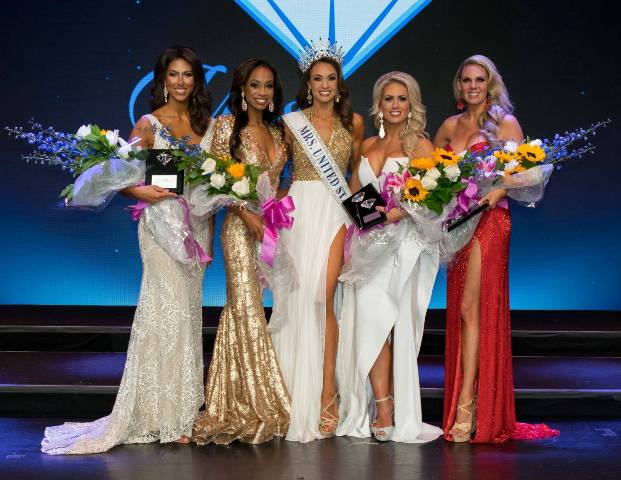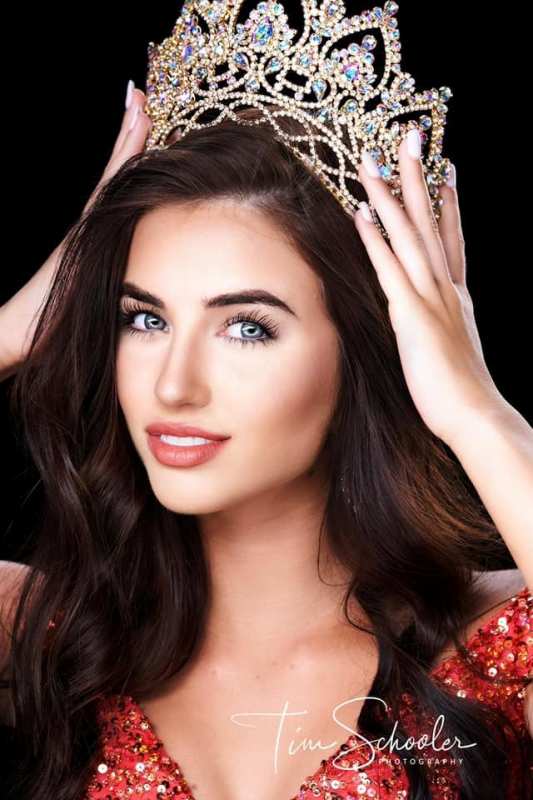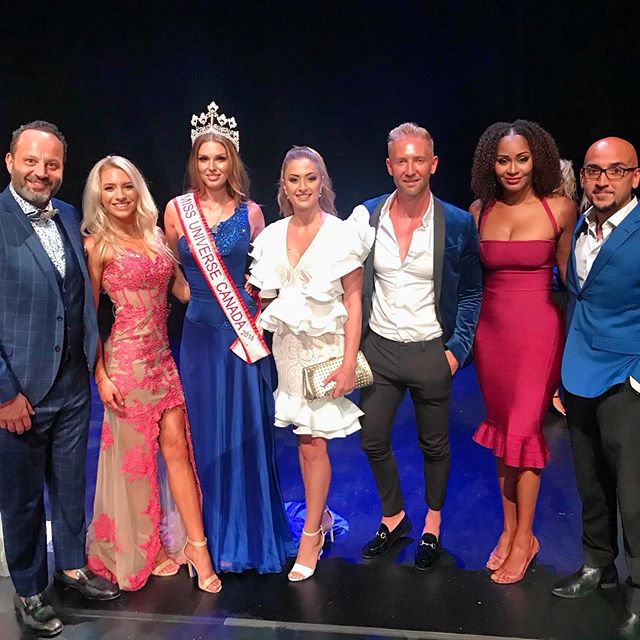Over 632.4K Daily Active Readers:
How Do Judges Score Beauty Pageants? Share on Social Media
Wouldn't you like to get into the mind of a pageant judge and know exactly what they are looking for? Know exactly how they score the contestants? While we can't read minds, we can give some insight on how exactly judges score beauty pageants.
Want to win your upcoming pageant? Check out Pageant Planet's Membership feature to begin your journey to the crown!

Miss Universe Belize 2019 with the judging panel. Photo: Miss Universe Belize Instagram
How Do Judges Score Beauty Pageants?
There is probably no area of pageant competition that is more confusing, frustrating and misunderstood than pageant scoring.
Pageants can be lots of fun because you get to have your hair and makeup done in an over-the-top glamorous way and wear one-of-a-kind evening gowns that you'd never get to wear any place other than a Hollywood red carpet. And, you get to strut your stuff on a giant stage, modeling fabulous fashions or performing your beloved talent for an appreciative audience. For those that come alive under the spotlight, love to entertain others and just generally enjoy the performance aspect of participating in pageants, it can be an intoxicating experience like no other!
But, after all is said and done, pageants are also a competition where the subtle details of our overall performance are filtered down into a measured result and assigned a quantitative score. And, it's that solitary score that seals our fate and ultimately determines how we place in the pageant.
No doubt, if you have been participating in pageants for any length of time, you have had the experience of being given a score or even a judge's personal assessment of you, and you either did not understand why you received the score or the feedback you got, or you strongly disagreed with it. We have all been through this experience and sad to say, it is without question, one of the most painful parts of the process. We all know in our hearts that another person's critique of our performance is often based on personal preference, and we also know that we should never allow the opinion of a total stranger to determine our own view of our self worth. We understand from a rational perspective that the judging process in pageantry is a subjective experience at best. It's not exactly the same kind of scoring system involved in a sport like figure skating where an athlete knows whether or not she has completed a double toe loop or a triple. Even in sport competitions, the judges are examining the performance closely for required skills and techniques, but they still assign scores based on their own individual interpretation of those skills and techniques. It is what it is. It's not a perfect system, “no system is,” but it's what we've got to work with.
You've likely heard the phrase, "Different day, different girl", or something similar, right? It means that the judging process can be so relative, that given another pageant day or even another set of judges, the results of the pageant (and the eventual winner) could be completely different. Even though there is a ring of truth to sayings like that, those kinds of explanations don't really console you when you're feeling down or wondering what you should do at your next pageant to increase your score.
As a contestant, you have the right to fully understand the complexities of the scoring system of every pageant that you enter, and you owe it to yourself to take charge of your side of the judging table. Our philosophy at Pageant Planet is that every contestant should be empowered to take ownership of their pageant preparation, as well as be in control of as much of their actual pageant experience as possible. If you're going to compete, then we say compete with excellence! And, that means being educated about how it all works. This is one of the reasons that we advocate pageant coaching and go out of our way to offer coaching services through our site. A coach can make all the difference in a contestant's ability to fully understand the scoring system of their prospective pageant, in addition to being able to master the nuances and intricacies of the judging process.
If you cannot afford a pageant coach, don't worry! That is why we are here. We're going to give you all the inside details about all of the different scoring systems out there, as well as give you some tips on how to boost your scores the next time you hit the stage!
Every system is different
Before we even get into how the judges themselves score beauty pageants, it's important to know how the pageant you are competing in scores as a whole. Do all areas of competition carry the same weight? Are certain areas worth a bigger percentage of your score than others? Do optional scores count to overall placements? These are the questions that if you are not asking, you should be! Pageants like USA National Miss have an equal scoring system. Interview, runway and evening gown are all worth exactly 1/3 of your total score. Pageants like the Miss America system have a percentage-based score. Knowing exactly how the pageant scores are calculated to determine the winner and how the pageant system treats scoring will help you not only better prepare for the pageant but also get a better understanding of how the judges score.
Styles of Pageant Scoring
Weighted Scoring
The majority of pageant systems today use the system known as the "Weighted Scoring" system. This is a very concise and easy to comprehend way of breaking down each phase of pageant competition. In weighted scoring, each area of competition is assigned a specific point value, typically translated into a percentage. Then, each of those point values are totaled and result in a final score.
For example, in the Miss USA system, each contestant is judged in three areas of competition that are equally weighted; Interview, Evening Gown and Fitness Wear (swimsuit for the Miss division and athleisure wear for the Teen division).
In the United States National Pageant system, their competition consists of four areas that are each equally weighted at 25%: Private Interview, Swimsuit & Sportswear, Evening Gown and On-stage Question.
The Miss Earth USA competition consists of multiple categories designed to select the best well-rounded national representatives, but they do things a little bit differently. The most heavily weighted categories are the Judge Interview, Evening Gown and Swimwear. And, the less heavily weighted categories are Environmental Project, Photogenic, Social Media, Media Interview and the Runway phase of competiton.
This way of scoring is a very user friendly process, and it allows each pageant system to create a set of scores for the areas of completion that they feel best results in the ideal titleholders.

Mrs. United States Court. Photo: United States National Pageants
Ballot Scoring
Ballot Scoring is a system that utilizes comparison judging because the judges are asked to compare contestants with each other in order to determine the final contestant ranking. In this system, each judge is given a ballot containing all of the contestant's names on it and then they assign each contestant a number that reflects how that judge feels they performed. Each judge's objective is to rank the contestants in order, as that particular judge would like to see them finish in the pageant.
For example, each judge would rank the contestant they want to be the winner as number "1" and then they would select the contestant that they want to be the first runner up as number "2" and so on down the list until the ranked each person participating in the pageant.
Because of the nature of this method of scoring, it is useful only in specific instances, such as in a small pageant, to break a tie or to determine a top five list.
Just as "Mention Scoring" is useful in assessing large groups of contestants, "Ballot Scoring" is useful when you have a smaller group of competitors. Therefore, this system is usually used in conjunction with other scoring methods such as "Strictly Points Scoring", "Mention Scoring" or "Ballot Scoring" for the final phase of a competition to select the court and the ultimate winner.
Mention Scoring
Mention Scoring is an unusual term, and most contestants don't hear about this type of scoring as much as the other types, but it is still used frequently. This type of scoring system is most often utilized in pageants where there are a large number of contestants competing. When judges are attempting to assess a large group of contestants, they need to whittle the group down to a manageable size in a short period of time. This method allows them to make a determination in a rapid and efficient manner. The term, "mention" comes from the idea that at the end of the scoring phase, the judges have a solid list of contestants that they want to "mention" or that they want to continue on in the competition.
It can work one of two ways. Either the judges just circle a specific number of contestants that they like the best out of the entire group and those are the ones that continue on in the pageant. Or, the judges simply assign a number "1" when a contestant is competent in an area or displays a high level of skill. And, then they assign a number "0" if a contestant is just average or below what is expected in that area.
For example, if there are a large number of contestants, like 50 or more, the director might instruct the judges to circle or select a total of 10 to 20 names on their ballot. As a result, the more often a contestant is selected, the greater the chance is that they will make the top 10 or top 20, or whatever the next cut is. Depending on the pageant, after the judges have selected or circled their top choices, they might then select their favorite contestants for the next round. For example, if the pageant went from 50 down to 20, then the judges may then use the same scoring process to determine their last ten finalists. Finally, they choose the one name they feel should be the titleholder.
This type of a scoring system may seem cold and impersonal, but when a judge has 50 or more contestants to assess, and they must do it quickly, assigning a one or a zero enables them to make a fairly competent decision. Imagine how long it would take if each judge had to assign a specific score to each contestant in a group of 50 or more girls.
Obviously, there are pros and cons to a system like this. The downside is that some contestants get overlooked because they don't shine or stand out in a large group, or because of the fact that you have different judges assigning numbers, you can end up with inconsistent lists. This means that the pageant has to have a solution to deal with these extra contestants who tie with each other.
Sometimes, when the Mention Scoring system is used, it is combined with another system. In the event that you have extra girls who have tied, the pageant then gives each judge a ballot with the names of all of those contestants. Then, each judge has to select which contestants that they feel are more competent to the other contestants on the list. Finally, those ballots are collected and the contestants with the most checkmarks are chosen to continue on to the next phase of the competition.

Miss Teen Earth USA 2019 Sydni Terradot. Photo: Tim Schooler Photography
Strictly Points Scoring
Strictly Points Scoring is a very straight forward system that a lot of pageants use simply because it is easy for both the judges and the contestants to understand. In this type of scoring, every contestant is assigned a score, typically from 1-10. Some pageants use a short range of numbers like 1 to 5 and some pageants use a higher range of numbers 1 to 20. It is important to note that the score can either be in whole numbers like a 5 or 7, or it can be in decimals.
Each contestant is assigned a numerical or decimal score based on their level of competency in an area, or based on their ability to display a requirement or skill. Ideally, the score is given just as the contestant leaves the stage. In some pageant systems, the contestants are given their scores throughout the entire pageant at each phase of the competition, such as interview, swimsuit and evening gown. Then, the winner is the contestant with the overall highest cumulative score.
But, in pageant systems that include a preliminary round in addition to a final round, the scores that the contestants earn during the preliminary portion just determine the next cut in the competition, such as a top 10 or top 5. At that point, typically each contestant's scores are dropped and contestants begin the next level of competition on a level playing field.
Depending on how many phases of competition there are and depending on the number of cuts, this process can go on for a while. At the end of the pageant, the scores are all totaled up and the top 5 and winner are chosen. In a strict point-based system, the contestant with the highest score is the winner.
Composite Score
In addition to all of the traditional scoring systems within pageantry, you may on occasion run into what is known as the "Composite Score". This type of scoring occurs when a contestant's preliminary scores are combined as part of their final score.
The Miss America system utilizes this type of system and just this year drastically changed the percentages for their entire scoring structure, including dropping the evening wear score. Previously, 25% of a contestant's composite score in the preliminaries was carried over to the finals, but just before the national pageant occurred, the contestants were notified that only 20% of a contestant's preliminary scores would now be combined as part of their final score.
In the Miss America system, the contestants are judged from 1 to 10 in each competition category, with the high and low scores thrown out. The preliminary scores then help the judges narrow the competition down to 15 finalists.
According to the breakdown released in an official memo to the state Executive Directors, 2020's scoring breakdown is as follows:
Preliminary Scoring
Personal Interview with Preliminary Judges - 20%
Preliminary Onstage Interview - 15%
Preliminary Talent - 50%
Social Impact Pitch - 15 %
Final Night Scoring
Composite Score - 20%
Final Onstage Interview - 25%
Final Talent - 30%
Social Impact Pitch - 20%
Unique scoring techniques
Start with a clean slate
There are some pageants, usually larger state or national pageants, that will give contestants a “clean slate.” This is usually when there is a preliminary competition and the semi-finalist or finalists have their preliminary scores “wiped clean” and they re-compete. Ask the director, previous contestants, or even previous judges for insight to how this works for the system you are competing in.

Miss Universe Canada Western Ontario Judging Panel. Photo: Jeanne Eid Instagram
Decimals
Some judges will score using decimals. Usually, this is used by the head judge at a pageant to help prevent ties. However, some pageants require for all of the judges to use decimal points. This system is very different from a pageant that only uses whole numbers. When judges use decimals for scoring, the scoring range can differ drastically. Some judges will only score using a “9” and the decimal point will be the sliding scale of 1-10. Other judges will completely use the entire range given to them.
Not all 6’s are equal
Many contestants worry when they receive a low score. Sometimes, a 6 for one judge can be equivalent to a 10 of another judge. How so? Well, get your thinking caps on because we’re about to hit you with some pageant math. Say there are three judges, each scoring on a scale of 1-10. If each judge gives at least one contestant a score of 10, then the max points for any one area of competition is 30. That is pretty easy and simple math. Now, let’s say that between those three judges, one of the judges only scores girls between a 4 and a 6. If this judge gives no contestant a score of 10, then the max number of points achievable in any area of competition is 26. Therefore, if that one judge scores you a 6, and the other two judges score you with 10’s, the weight of that one judges 6 is equivalent to the other two judges 10’s.
Are you with us so far?
Now, this is where it gets a little tricky. Although the max number of points allowed in an area of competition is 30, as per the pageant, this is not always the maximum number of points achievable. If two judges never give over an 8 and one judge never gives over a 6, the maximum number of achievable points for one area of competition is only 22. Meaning for a pageant with three areas of competition a perfect score is 66 and not 90. Of course, without the full score sheet of every contestant in a pageant, you will never know if that 6 you receive is equal to 100% or 60%. However, if you win with two 8’s and a 6, you can assume that those 8’s are not equal to 80%, however, you cannot assume that they are equal to 100% either.
What judges are looking for:
So by now, you should almost be a pageant judge scoring expert. You know that every system weighs scores differently, that some pageants and individual judges will use decimals, and now you even know that not all 6’s are equal. What you don’t know yet, is what judges are looking for when they score a pageant. The simplest answer: confidence. They are looking for a girl that can do the job, do it well and be 100% genuine.
Logan West, Miss Teen USA 2012, said, "Win, loose, or draw, just know that when you put it all out on the stage, don't second guess anything. Be yourself, and do your thing!" Moving forward, just remember that every judge is going to score and judge every girl differently. They each have their own unique opinions on what a titleholder should look like and what she should act like. While you will never be able to please everyone, as long as you please yourself, you can always walk away a winner.











Sadagicous Owens [email protected]
Great topics. Thank you. ? ??
May 02, 2023